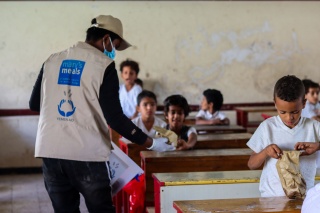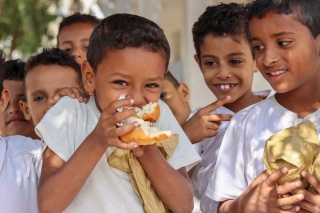Yemen: School Feeding for The Most Vulnerable
More than seven years of an unrelenting civil war have devastated the country of Yemen and its people. Thousands are dead, and an estimated 4.2 million people displaced.
More than seven years of an unrelenting civil war have devastated the country of Yemen and its people. Thousands are dead, and an estimated 4.2 million people displaced. A truce between the two warring sides (the Yemeni government and Houthi rebels) has seen a welcomed reduction in violence over the past few months, although small-scale fighting continues and the pervading humanitarian crisis is deepening.
As a country dependent on direct imports of wheat for food – Russia and Ukraine provide more than a third of Yemen’s wheat supplies – the war in Ukraine and soaring prices have further escalated the acute need of the Yemeni people. Currently, more than half of the population (15.5 million) have insufficient food consumption. Almost half of all children under five face malnutrition. The likelihood of people experiencing famine-like levels of hunger is expected to increase fivefold by the end of the year.
Mary’s Meals has been serving extremely vulnerable children in Yemen since 2021. Our programme is delivered by our trusted partners, Yemen Aid, in four schools in the Al Mansoora district of Aden – an area home to many internally displaced people (IDPs) and other marginalised populations who all experience high levels of hunger. For children in this situation, a guaranteed meal at school can be life changing.

To share more insight on the critical situation on the ground and the challenges facing children across the country, we spoke with Salah M. Esmail, grants and partnerships manager at Yemen Aid.
“Yemen’s socioeconomic environment continues to deteriorate this year: livelihoods have been destroyed, incomes reduced, there are fuel supply shortages and the rial [the official currency in Yemen] continues to depreciate. Food supply challenges are also possible because of the war in Ukraine, given that Yemen imports a large share of wheat from Russia and Ukraine. These factors will continue to affect the availability, affordability and accessibility of essential goods and services throughout the country."
“Children in Yemen are among the most vulnerable and affected groups by the conflict; thousands have been injured or killed and hundreds of thousands forced to flee. They are also malnourished, out of school and many others are forced to join the fighting.”

Against a backdrop of violence and unrest, Salah says children’s education has paid a high price and the system itself is “on the verge of collapse”. As it stands, over 2 million school-age children are out of school, a figure which has doubled since 2015, shortly after the conflict started, and at least one in four schools have been destroyed, damaged or changed purpose for non-educational uses.
“Yemen has one of the highest education absenteeism [figures] worldwide ... and the education system is on the verge of collapse. Many vulnerable families are especially likely to keep their children home from school because of their limited resources and their inability to provide essentials such as breakfast, school uniforms or learning kits. Girls who are out of school are more at risk of early marriage and domestic violence, while boys who are out of school are more at risk of being recruited [for fighting].”
Salah concludes by sharing the impact of school feeding on Yemen’s vulnerable children, and the benefits that stem from accessible education for all.
“In Yemen Aid, we believe that free quality education is a cornerstone in the fight against poverty and inequality, and it plays a key role in the development of social and economic justice, gender equality and sound democracies. It is a fundamental and enabling human right.
“One of the great ways to support the children in Yemen is through school feeding assistance as it can make a difference to their current lives and their futures. It [school feeding] contributes to ensuring access to free education; increases school enrolment and mitigates dropouts – when children know they’ll receive a meal at school every day, it keeps them in the classroom.
“Furthermore, the school feeding programme reduces the rate of malnutrition among children, from which millions of children in Yemen suffer. Students who stay in school longer and have proper nutrition throughout that time are more likely to find employment and be financially stable over their lifetimes.”
In Yemen, 4,491 children are safe in the knowledge that they will receive a nutritious meal at school every day from Mary’s Meals. To help us reach more of the world’s most vulnerable children with life- changing daily meals, please act now and donate.

We're now feeding more than 2.6 million children every school day.
But more than 71 million primary school-age children are out of school around the world. In order to survive, they have to work or beg. Even if they do make it into the classroom, hunger affects their ability to learn.
